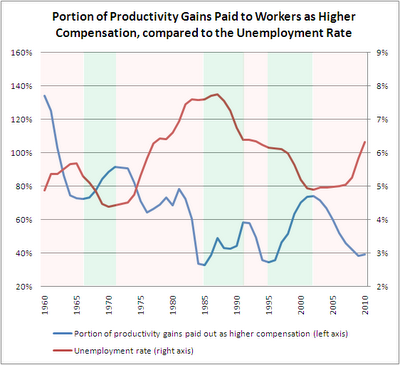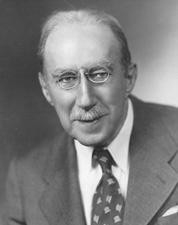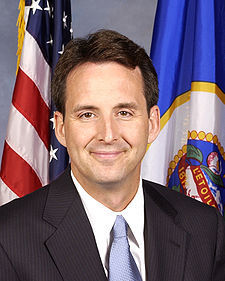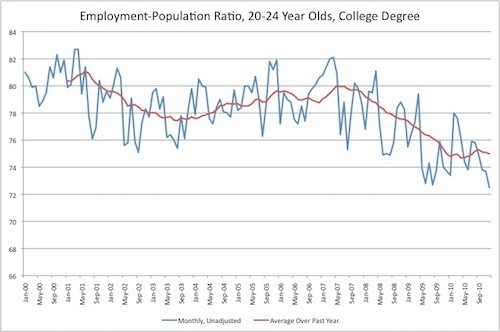Matthew Yglesias's Blog, page 2375
March 26, 2011
John Quincy Obama
Daniel Walker Howe on the enduring problematics of technocratic governance in the United States:
[John Quincy] Adams's difficulties did not simply result from his crotchety temperament, nor from any refusal on his part to engage in political calculation. They stemmed most obviously from the determination, ruthlessness, and skill of his opponents, especially Martin Van Buren. Adams's program of government activism had a fighting chance for adoption on the strength of its merits and was not inevitably doomed. But his administration suffered from an incompatibility between the president's means and ends. Adams wanted to govern by consensus, as Monroe had done, but at the same time he wanted to press an agenda of major policy innovations. The president's goals, openly avowed, proved too controversial to permit implementation by consensus. The Monroe model of governance did not fit with Adams's bold program in domestic and foreign affairs.
The more things change….


Unemployment and Compensation
This is pretty obvious, but as you can see below having a high level of unemployment means workers don't get paid very much:

Put this in your "progressives need to care about monetary policy" file.


The Case Against The AT&T Merger
Interestingly, The Economist is among those urging the Obama administration to block the AT&T/T-Mobile merger:
The suspicion is that Mr Obama, desperate both to build some broken fences with big business and to make progress on connecting every American home to the internet, will give in. In fact he should push the FCC to promote more competition—by, for instance, allowing other firms to buy bulk wireless capacity from AT&T and resell it, by freeing up underused spectrum and by making local phone and cable firms share their wires. A duopoly would in the end reduce choice for American consumers, and be hard to reverse. Best to block it.
Meanwhile, just about everyone seems to agree that a huge underlying problem here is spectrum scarcity caused in part by so much of it being taken up by broadcast television operators who didn't pay for it and can't sell or lease it.


March 25, 2011
Rhode Island Politics

Karl Kurtz quotes Gregory Kroger on perhaps the greatest state level filibuster of all time:
In January 1923, the Democratic minority in the Rhode Island Senate began a low-intensity filibuster against all major legislation in an effort to force the Republican majority to call for a new constitutional convention. They were aided by a Democratic Lieutenant Governor presiding over the Senate, Felix Toupin, who refused to recognize any Republicans seeking to make motions, except a motion to call for a convention. This conflict reached a peak in June, 1924 when the Rhode Island Senate stayed in continuous session for 22 hours until the Republican majority simply got up and left. Three days later they returned for a 42-hour day-and-night session which began with a mass fistfight over control of the gavel and ended when Republican operatives placed a poison-soaked rag behind Toupin to gas him out of the presiding officer's chair. No one was permanently harmed, but the Republican majority relocated to Rutland, Massachusetts for six months until Republican victories in the 1924 elections put an end to the struggle.
Part of the background here is that in these pre Baker v Carr days, the Rhode Island state legislature was horribly mis-apportioned, which gave the GOP a stranglehold on the legislature notwithstanding massive Democratic support from Catholic voters in growing cities. Eventually the Great Depression brought on such a Democratic wave that Theodore Francis Green got in as governor and perpetrated a quasi-legal "bloodless revolution" that changed the state constitution.


Is Our College Graduates Working?
New Haven Is Poor, New Haven County Is Rich

Joseph Delaney thinks that playing host to a prestigious university is no ticket to prosperity:
Mark has been discussing Edward Glaeser and his comments on how universities can create urban prosperity. Now, I am a big fan of universities and think that they serve an important role in global economic development. However, I am dubious that they make any particular community prosperous. Consider New Haven, CT — the home of Yale University (recently ranked the #11 university in the world).
According to wikipedia, the poverty rate in New Haven is 24%, which compares unfavorably with the rest of the United States where it is 14%. The poverty rate in New Haven, despite the presence of Yale, is nearly twice that of the United States as a whole.
I think this is the wrong level of analysis. The city of New Haven is a very small entity. New Haven county in which it's located has a median household income of over $68,000 a year. It's much richer than the American average. And Connecticut is one of the richest states in the union. Most American cities don't really work as economic units. Lots of people who work at Yale, or in downtown New Haven, or who generally benefit from Yale-related prosperity don't live within the municipal boundaries of New Haven.


Regime Change Fever Reaches Canada

The three opposition parties that together have a majority in Canada's parliament have finally teamed up to topple Stephen Harper's conservative minority government. Harper's always been in a precarious position because all three of the opposition parties are generally to the left of Harper's Conservatives. In other words, the median MP has usually been a Liberal even though the Conservatives had the largest delegation. All that said, the early polling looks favorable for Harper:
But Liberal Leader Michael Ignatieff should pause before celebrating. Most polls continue to show the Conservatives well ahead of the Liberals. An Ipsos-Reid poll released on Thursday has the Conservatives at 43-per-cent support, in majority-government territory, with the Liberals far behind at 24 per cent. The NDP enjoyed 16 per cent support, while the Bloc Québécois has 41 per cent of the vote in Quebec.
Since Canada has first past the post voting, the geographical distribution of support winds up mattering a great deal.


The Emerging Conservative Coalition in Egypt

Michael Slackman reports on the shifting political sands in Egypt:
In post-revolutionary Egypt, where hope and confusion collide in the daily struggle to build a new nation, religion has emerged as a powerful political force, following an uprising that was based on secular ideals. The Muslim Brotherhood, an Islamist group once banned by the state, is at the forefront, transformed into a tacit partner with the military government that many fear will thwart fundamental changes. It is also clear that the young, educated secular activists who initially propelled the nonideological revolution are no longer the driving political force — at least not at the moment. As the best organized and most extensive opposition movement in Egypt, the Muslim Brotherhood was expected to have an edge in the contest for influence. But what surprises many is its link to a military that vilified it.
What's interesting about this, on some level, is how banal it is. A political coalition between religious conservatives, the military, and economic elites is the bedrock of center-right politics in most democracies. And, again, in most democracies the main conservative party usually wins the elections. There's a powerful logic to this sort of alliance, so while its emergence in Egypt is surprising there's also something non-surprising about it.


DC's House Shortage
Marion Barry gives his view of demographic change:
"We're going to stop this trend — gentrification," said D.C. Council member Marion Barry (D-Ward 8). "We can't displace old-time Washingtonians."
"The key to keeping this city black is jobs, jobs, jobs for black people so they can have a better quality of life in neighborhoods in the city," he added. "I believe in integration, but I don't believe in the apartheid we have in Ward 8. You don't see corner stores in Ward 3. You don't see the liquor stores."
This is, I think, a mistake. The labor market in the Washington, DC Metropolitan Statistical Area is among the strongest in the entire country. Obviously more employment opportunities would be welcome, but lack of employment opportunities isn't really a characteristic of this city. The issue, it seems to me, is that while DC is a relatively good place to be an unemployed person since you can get around without a car and we have relatively generous means-tested welfare programs it's not a very attractive place to move up the economic ladder. If you get a job and your income goes up to the point where you lose benefit eligibility, then suddenly DC is just a place with bad public schools and expensive houses. The natural thing to do is to migrate to someplace else in the metro area where housing costs are lower. Better schools would be a good thing, but would only further escalate housing costs.
For the city to become a more attractive place for working class people to live, the housing stock needs to expand at a much more rapid pace. You do, in fact, sees liquor stores in Ward 3. What you don't see is a level of residential density that rises with growing demand for housing.


Tim Pawlenty and Sharia

Tim Pawlenty is positioning himself as the "generic Republican" in the 2012 field, but like with Newt Gingrich on climate and Mitt Romney on health care, he seems to have a secret stealth past as someone with some reasonable ideas. For example, Adam Serwer writes about a short-lived Pawlenty initiative to encourage sharia-compliant mortgages in Minnesota to help boost homeownership among the state's relatively large Muslim population:
Pawlenty's effort to increase minority homeownership by encouraging companies to offer Sharia-compliant mortgages was entirely in keeping with his reputation as a "Sam's Club Republican" concerned with helping "regular people." But in the 2012 race, he'll be up against competitors who may try to use it against him.
One of Pawlenty's potential rivals, former Pennsylvania Sen. Rick Santorum, recently said that "Sharia law is incompatible with American jurisprudence and our Constitution." Fellow potential 2012 rival Newt Gingrich called for a federal ban on Sharia law last year. In 2008, the Thomas More Law Center sued the Treasury Department, charging that the bailout of American International Group violated the establishment clause because AIG was offering its customers Sharia-compliant homeowner's insurance. One of the lawyers litigating that case, David Yerushalmi, is associated with Frank Gaffney's Center for Security Policy, which has long warned that Muslims are seeking to replace the Constitution with Sharia law. Gaffney himself has warned that Sharia-compliant finance is a Muslim Brotherhood plot to facilitate the "penetration of Sharia into Western societies by mainlining it into their capitalist bloodstreams." When Justice Elena Kagan was nominated to the Supreme Court, National Review columnist Andrew C. McCarthy accused Kagan of attempting "to promote Shariah compliance in the U.S. financial sector," because she set up a program for studying Islamic finance at Harvard. Pawlenty's efforts could draw similar accusations.
Michele Bachmann is popular with Republican voters precisely because she's a genuine kook. Few people have the kind of record of unvarnished nuttiness that the situation really calls for.


Matthew Yglesias's Blog
- Matthew Yglesias's profile
- 72 followers





